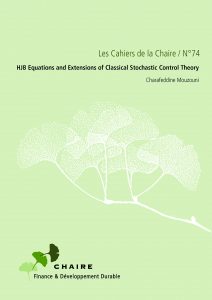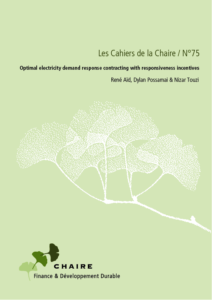 by René Aïd, Dylan Possamai & Nizar Touzi
by René Aïd, Dylan Possamai & Nizar Touzi
Despite the success of demand response programs in retail electricity markets in reducing average consumption, the literature shows failure to reduce the variance of consumers’ responses. This paper aims at designing demand response contracts which allow to act on both the average consumption and its variance. The interaction between the producer and the consumer is modeled as a Principal-Agent problem, thus accounting for the moral hazard underlying demand response programs. The producer, facing the limited flexibility of production, pays an appropriate incentive compensation in order to encourages the consumer to reduce his average consumption and to enhance his responsiveness. We provide closed-form solution for the optimal contract in the case of linear energy valuation. Without responsiveness incentive, this solution decomposes into a fixed premium for enrolment and a proportional price for the energy consumed, in agreement with previously observed demand response contracts. The responsiveness incentive induces a new component in the contract with payment rate on the consumption quadratic variation. Furthermore, in both cases, the components of the premium exhibit a dependence on the duration of the demand response event. In particular, the fixed component is negative for sufficiently long events. Finally, under the optimal contract with optimal consumer behaviour, the resulting consumption volatility may decrease as required, but it may also increase depending on the risk aversion parameters of both actors. This agrees with standard risk sharing effects. The calibration of our model to publicly available data of a large scale demand response experiment predicts a significant increase of responsiveness under our optimal contract, a significant increase of the producer satisfaction, and a significant decrease of the consumption volatility. The stability of our explicit optimal contract is justified by appropriate sensitivity analysis.
Download the paper
More working papers
 June 30 – July 4 2025, Centre Paul Langevin, Aussois
June 30 – July 4 2025, Centre Paul Langevin, Aussois
 Venue :
Venue : MATS Seminar // 15 May 2024 // Collège de France
MATS Seminar // 15 May 2024 // Collège de France 12-16 Jun 2023, Centre Paul Langevin, Aussois
12-16 Jun 2023, Centre Paul Langevin, Aussois Nous avons le plaisir d’annoncer le renouvellement de la Chaire FDD et de l’Initiative de Recherche « Laboratoire FiME », à partir du 1er janvier 2022 et pour 5 années supplémentaires. Ce renouvellement a été rendu possible par le soutien et l’engagement exceptionnels des partenaires qui accompagnent ces projets depuis leurs débuts en 2006 : les mécènes, EDF R&D et le Crédit Agricole – CIB ; les partenaires académiques, l’Université Paris-Dauphine et l’École Polytechnique ; la Fondation Institut Europlace de Finance et l’Institut Louis Bachelier qui hébergent ces deux projets sur les plans juridique, administratif et organisationnel.
Nous avons le plaisir d’annoncer le renouvellement de la Chaire FDD et de l’Initiative de Recherche « Laboratoire FiME », à partir du 1er janvier 2022 et pour 5 années supplémentaires. Ce renouvellement a été rendu possible par le soutien et l’engagement exceptionnels des partenaires qui accompagnent ces projets depuis leurs débuts en 2006 : les mécènes, EDF R&D et le Crédit Agricole – CIB ; les partenaires académiques, l’Université Paris-Dauphine et l’École Polytechnique ; la Fondation Institut Europlace de Finance et l’Institut Louis Bachelier qui hébergent ces deux projets sur les plans juridique, administratif et organisationnel. November 16-19, 2021, IMSI, Chicago
November 16-19, 2021, IMSI, Chicago 22-23 septembre, 2021, EDF Lab, Palaiseau
22-23 septembre, 2021, EDF Lab, Palaiseau June 14-18, 2021, CIRM (Luminy, France)
June 14-18, 2021, CIRM (Luminy, France)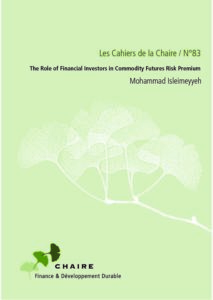
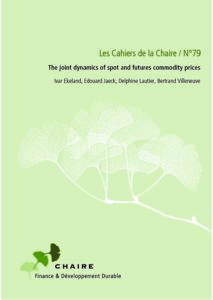
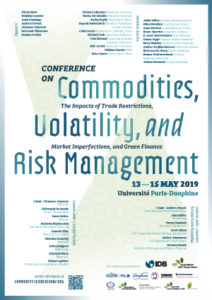
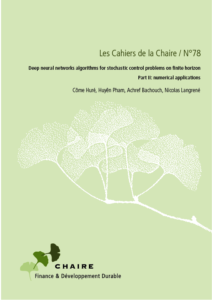
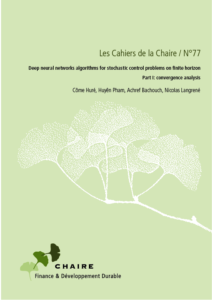
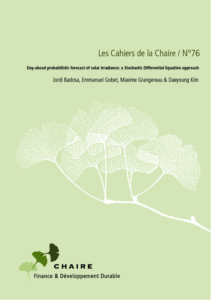

 Conference CAESARS 2018
Conference CAESARS 2018
 The large-scale development of renewable energy production prompts us to rethink the structure of the modelling of pricing processes and how we conceive financial risks in the energy markets. Because this development accentuates the impact on market prices of global warming, better consideration of this link should enable portfolio managers exposed to the energy markets to more clearly understand the risks and to determine optimal strategies for hedging them. In this context, the current challenges concern: (1) the definition of models suited to risk assessment, measurement and hedging applications; (2) development of forecasting tools, both of climate variables and market prices; and (3) effective statistical estimation procedures.
The large-scale development of renewable energy production prompts us to rethink the structure of the modelling of pricing processes and how we conceive financial risks in the energy markets. Because this development accentuates the impact on market prices of global warming, better consideration of this link should enable portfolio managers exposed to the energy markets to more clearly understand the risks and to determine optimal strategies for hedging them. In this context, the current challenges concern: (1) the definition of models suited to risk assessment, measurement and hedging applications; (2) development of forecasting tools, both of climate variables and market prices; and (3) effective statistical estimation procedures.